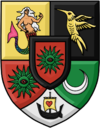Supreme Court of Sabia and Verona
| Supreme Court of Sabia and Verona | |
|---|---|
| raitoanobók sabiann i veronann | |
 | |
| Established | 23 May 2017 (as Supreme Court) 1 October 2015 (as Tribunal) |
| Jurisdiction | Sabia and Verona |
| Location | Tairagiħrét, Darmosari, Alios |
| Composition | Appointment by the King on the Prime Minister's advice with confirmation by Parliament |
| Authorized by | Constitution Title VII |
| Term length | 3 years |
| Seats | 3 |
| President of the Supreme Court | |
| Incumbent | The Baron Jens-Galieri |
| Since | 23 May 2020 |
| Sabia and Verona |
| This article is part of the series |
| Politics and government of Sabia and Verona |
| Constitution |
|---|
| Supreme Court |
| Electoral Commission |
| Foreign relations |
| History |
The Supreme Court of Sabia and Verona (Sabian: raitoanobók) is the highest judicial authority in the Kingdom of Sabia and Verona and the head of the judicial branch of the Sabioveronese state. It is composed of three judges known as magistrates (toaveiagi), one of whom is designated President of the Supreme Court. All magistrates serve three-year terms and are eligible for indefinite re-appointment.
Magistrates of the Supreme Court are appointed by the King on advice of the Prime Minister, and confirmed by the Parliament. The President of the court is also chosen by Parliament from the sitting magistrates, and the position is then rotated among them in order of seniority. The present President of the court is Léon Jens-Galieri, who has been a magistrate since 23 May 2017.
The Supreme Court in its present form was established by the Constitution of 2017, which established the current judicial system. The past Constitution of 2015 mandated the existence of the Tribunal, which was de facto the supreme court of Sabia and Verona as it was the only court of law in the Kingdom. The present judicial system is composed of three levels of courts; the lower District Courts, the Courts of Appeal and finally the Supreme Court atop the judicial hierarchy. Before the establishment of the old Tribunal by the Constitution of 2015, the Sabioveronese judiciary was vested upon the Courts of Sabia and Verona, the Kingdom's former legislative body, and before that, in the Commission for the Preservation of Democracy, also known as the Karasal Council.
History
There were no mentions to the judiciary in early Sabioveronese law. Judicial functions were, when needed, delegated upon the Courts of Sabia and Verona, though during the first months of existence of Sabia and Verona there was no need for a standing court of justice. When the Karasal Treaty was signed in December 2012, the Regional Committee for Democracy and Stability in Sabia and Verona (later renamed Commission for the Preservation of Democracy), commonly known as the DMDK was created and since then it served as the Kingdom's judiciary,[1] tending to important cases such as Sabia & Verona v. Schubert-Moss.
Following the creation of the Federal Union of Juclandian Lands, the Judicial Power of the Courts, a commission made by the Court's Senators and five Chamber of Deputies members, became the Kingdom's new judiciary. This arrangement was not particularly popular among the provincial citizens of Sabia and Verona, who saw the preference of federal Senators over provincial Deputies unfair. The Judicial Power of the Courts never actually preceded over a case, and when the 2014 constitution was replaced by the new 2015 one, the body, alongside the Legislative Courts, became obsolte.
In 2015 the new constitution was adopted. The new constitution divided the Sabioveronese state into the Executive Sounos, the Legislative Sounos and the Judicial Sounos. The Tribunal was originally to be composed of three members. Mei Xiongmao, Dimeros Grenouille and Airios Gouraesy were elected by King Tarik as the first Justices of the Judicial Sounos, with Xiongmao serving as the first Chief Justice. Three additional members were appointed by Tarik in the following days, but Justice Franxêska Bagos, one of the new justices, decided to abandon her seat to run for a seat in Parliament, which she won at the 2015 election. Other justices, like Hardanê Ban Bagor in 2016 and Dímeros Grenouille in 2017 followed suit.
The adoption of the Constitution of 2017 reformed the entire judicial system in Sabia and Verona, and dissolved the Tribunal to replace it with the Supreme Court and a number of inferior courts in the central regions: the Courts of Appeal and the District Courts. Three magistrates were appointed to the Supreme Court by the 3rd Parliament of Sabia and Verona: two-time Prime Minister Léon Jens-Galieri, Anton Schubert-Moss, and former Chief Justice Mei Xiongmao.
Constitutional provisions
The role of the Supreme Court is defined in Title VII of the present Constitution of Sabia and Verona, which encompasses articles 76 to 84. It establishes the basic judicial hierarchy, with the Supreme Court at the top to serve as the Kingdom's court of last instance and as constitutional court. It also establishes the term length of Supreme Court magistrates, and the manner in which the presidency of the Court will rotate amongst the magistrates.
Article 78 lists the matters over which the Supreme Court has original jurisdiction: public destitution of elected officials, the dissolution of a political party, and ambiguities over competence between state agencies and national, regional and prefectural administrations.
Magistrates
The Supreme Court is composed of a number of magistrates (toaveiagi) appointed by the Monarch, on advice of the Prime Minister and confirmation of the Parliament. The exact number of magistrates the Supreme Court is to have is determined by a special law. The magistrates are presided by a President of the Supreme Court, who initially appointed by the Parliament and serves for a year-long term. The presidency then rotates among magistrates in order of seniority.
The President manages the affairs of the court, directs court sessions and divides tasks among the magistrates and the employees of the court and maintains disciplinary supervision. They are responsible for the operation and finances of the Supreme Court and represents the judiciary in the public eye. This tradition comes from the Chief Justice of the old Tribunal.[2]
The current three magistrates of the Court were all confirmed by the 3rd Parliament of Sabia and Verona upon the creation of the Supreme Court in 2017, and appointed by the King on 22 May 2017.
| Title | Name | District | Tenure | Confirmation | Former position | |
|---|---|---|---|---|---|---|
| Magistrate | The Honorable The Baroness Xiongmao (Mei Xiongmao) |
Alios | 23 May 2017 |
present | 3rd Parliament 5th Parliament |
Chief Justice (2015–17) |
| 3 years, 1526 days | ||||||
| Magistrate | The Honorable The Baron Schubert-Moss (Anton Nathaniel Schubert-Moss) |
Alios | 23 May 2017 |
present | 3rd Parliament 5th Parliament |
Secretary of Welfare (2016–17) see all |
| 3 years, 1526 days | ||||||
| President | The Honorable The Baron Jens-Galieri (Léon Silvio Jens-Galieri) |
Alios | 23 May 2017 |
present | 3rd Parliament 5th Parliament |
Prime Minister (2014 & 2015) see all |
| 3 years, 1526 days | ||||||
References
- ↑ "Language reform, Karasal Treaty and Ryəmoništa". The SiV Phonograph. 16 December 2012.
- ↑ "Mayor Judge, the perpetual Goyo and the gossip of it all: the 2016 campaign so far". The SiV Phonograph. 11 September 2016. Retrieved 10 October 2016.

